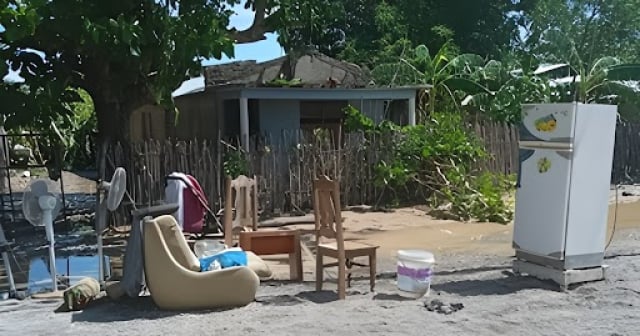The tragedy hit the community of San Antonio del Sur hard when a cyclone struck the region, causing a marine penetration of more than one and a half meters. The residents of the area, in tears, recount the hours of anguish and despair they experienced while trying to save what little they could from their flooded homes.
In a TikTok video by El pibe cubano, residents recount the moments of desperation they experienced.
"The water was here up to our necks," recounts a neighbor, recalling how the water level rose rapidly, forcing them to seek refuge. "We lifted him onto a cabinet to save the three children we had there," he adds, describing the desperate effort to keep the little ones safe.
Another neighbor, with a broken voice, recounts how it felt to see her belongings swept away by the current. "I lost everything. I didn't even have time to take out the mattresses," she says while pointing to what remains of her house. "The sea came in so quickly that we didn't have time for anything. By the time we came to check, it was already inside the house."
"The hardest part was hearing the children crying," shared a father. "They didn't understand what was happening; they only knew that the water was surrounding us and that everything was getting wet. We didn't know if we were going to make it out of this."
A mother recounts how she had to hold her children tightly to calm them as the water rose. "I told them not to worry, that everything would be over soon, but inside I was terrified," she confesses. "I had never seen anything like this in my entire life. The water took away all our memories, all the things we had worked so hard to achieve."
Another neighbor recounts how he tried to protect what little he could: "We moved the furniture onto the tables, but it was useless. The water covered everything. My papers got wet, the clothes, even the food was lost. Now I don’t know what we’re going to do."
Amid the despair, stories of solidarity also emerge. "We helped each other; some neighbors lent a hand to get the children out of the houses before the water rose further," a young man comments. "Despite everything, there were people who didn't hesitate to offer assistance, even though they were in the same situation."
Since October 20, 2024, Hurricane Oscar's passage left a trail of destruction in San Antonio del Sur, Guantánamo. The weather phenomenon caused heavy rainfall that led to severe flooding, with sudden river rises and overflow that caught the population off guard. Many families found themselves trapped in their homes, where the water rose rapidly, forcing them to seek refuge in higher ground. In several households, the water level reached the rooftops, and in some cases, residents had to escape through small openings or seek shelter in nearby neighbors’ homes. The desperation of a Cuban family trapped reflects the anguish experienced during those moments.
The situation worsened due to a massive blackout that left much of the region without electricity days before the hurricane's arrival. This power outage prevented many families from receiving timely weather information and emergency alerts, increasing their vulnerability to rising waters. With no access to communications, residents were isolated and unable to coordinate evacuations effectively. Rumors about a possible dam failure caused panic among the residents, who, lacking clear official information, took desperate measures to protect themselves by abandoning their homes and fleeing to the mountains.
The response from the authorities, including evacuation efforts, was considered late and insufficient by many of those affected. Despite government statements prioritizing recovery in Guantánamo, local communities criticized the lack of preparedness and the limited support received during the most critical moments of the emergency. Rescue operations were hampered by difficult conditions and poor communication, while families struggled to cope with the loss of their possessions and the uncertainty regarding the whereabouts of their loved ones.
What do you think?
COMMENTFiled under:
